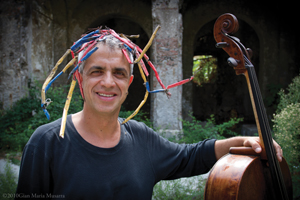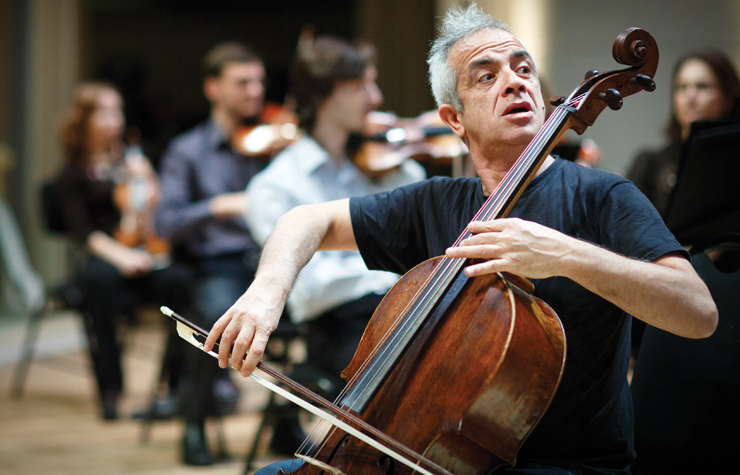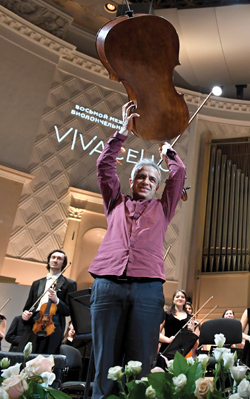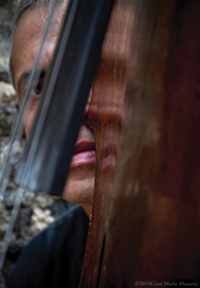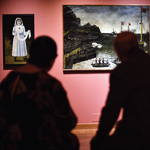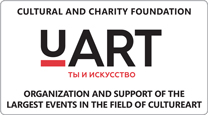Giovanni Sollima: “ You can be very ‘ modern’ but disconnected from life”
At the Vivacello festival, the Italian cellist and composer performed his Antidotum Tarantulae XXI concert for the first time in Russia. This “modern antidote for tarantula bite” stirred, probably, most discussions in the press and among the festival visitors alike. The expressive modern music is in conversation with the past, with the Renaissance and Baroque — and for explanations we turned to Giovanni Sollima himself.
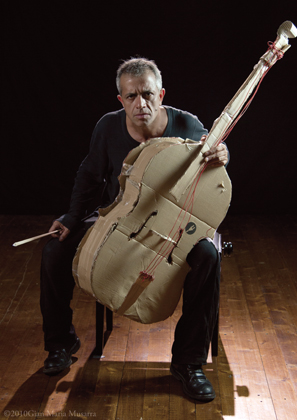 — Giovanni, yesterday was the first time we heard your concert
in Russia. The premiere was a great success, the audience wasn't
letting you to leave the stage! Please tell us about this
piece.
— Giovanni, yesterday was the first time we heard your concert
in Russia. The premiere was a great success, the audience wasn't
letting you to leave the stage! Please tell us about this
piece.
— For the first time I performed this concert in Chicago
So, after I took part in that festival for the second time, the tarantella melodies just kept running through my body all the time, it lasted several months. You could say that I wrote this piece to get rid of the Taranta, to give it a way out. Of course, this concert isn't limited to the concept of tarantism — I also wanted to express my understanding of the old Italy, the Renaissance and Baroque.
— For Vivacello, have you prepared a special version of the work?
— Special version? No, it's the same thing. It's just that every performance is different. I understand your question, but I never revise my work. I mean, I can arrange music for an orchestra or a rock band, but that's a different story. Or, for example, I could adapt music written for a modern group to be performed by a baroque quartet. The score remains the same, there were just a few options to use with the bandir — that's North African drums — or Indian tabla, for example. I like this sort of ideas — when you can change something, experiment… although sometimes it sounds strange.
|
Giovanni Sollima’s experiments go beyond music |
— The concert is structured as a dialogue of two solo cellos, and yesterday you had this dialogue with Boris Andrianov. Do you meet and talk outside music?
— Well, it's like this: if you are not friends with a partner musician on the stage, then you should become friends. As for Borya, we have been friends for a long time and communicate via Facebook or WhatsApp, even about small matters. In my opinion, it's great that we, cellists, can hang out together like that. I noticed that among violinists or pianists this happens less often. Cellists are more involved with one another, we can sometimes have a drink together, celebrate something. Perhaps the reason is in the instrument: the cello makes a person more sociable.
— Does the instrument really influence you?
— Yes, of course, the instrument has its effect, and there are many reasons for that. When you play, the cello interacts with almost your entire body. Some part of the acoustic wave, the melody goes into space, and the other part, directly into you, and you feel it physically. It's hard to say anything definite about this, it's very personal. I think I was born with the sound of cello inside. I always feel this sound. My mother told me that I listened to music before birth, because it was already being performed in the house. When my mother was pregnant, my father used to play a duet with a cellist. Possibly that's why the cello sound for me is very familiar and reminds me of home.
|
A rehearsal before the closing concert of the Vivacello festival |
|
After the premiere at the Tchaikovsky Concert Hall |
— In Italian culture, a lot of important and beautiful is
associated with the Baroque, with old times. It is clear that there is a need
to create something fundamentally new. But the old architects, the
conservatory, art museums — it's all incredible. That's why people from
all over the world go to Italy to see this. And then you can take on some
mysterious air, enter the role and explain to people the meaning of life
and how they should live it. Or you can act in another way and play it open,
and then absolutely new things are born. And it's cool! I play in a rock band,
we give concerts wearing ripped jeans but in the baroque style, so what you get
— Your name can often be found next to the words “modernity”, “ultramodern music”. How do you feel about these concepts?
— My take on this is that when a musician starts
thinking something like “I'm modern” — that's already a problem,
and it's time to leave the stage. “Modernity”, “modern”,
— In the beginning of your current visit to Russia, you gave interviews and mentioned that music quickly becomes obsolete. Could you explain what you meant?
|
In many works, the composer looks at modernity through the prism of the classical Italian art |
— Yes, music does get old, and there's nothing wrong with that. There is music that everyone likes, but it's made for onetime use. And this is very good too because it has its place in the world… I have many friends among DJs, they say: we make music and make great money making music. They don't even bother saving it to the computer — they just delete it immediately because a new one is needed. In general, you ought to be able to see the difference … no, I won't say that a certain type of music becomes a classic after a given number of years. When we hear the word “classic”, we recall, let's say, Chopin — but in reality, time passes, and many things created in the last century are already classics. What was done in the 1950s, 60s, 70s… Perhaps a classic is simply something that has become almost sacred to people. And that's that.
— Giovanni, this is the third time you are participating in the Vivacello festival. Do you see any distinctive features, specifics of the festival?
— It's always some new things, but also there is a clear idea and organization. The traditional formula is a large festival lasting for many days and a series of master classes. But the organizers of Vivacello have created something more compact, and at the same time the repertoire is great, featuring some special projects and new music. I really liked everything. And the atmosphere is excellent, very warm. During my performance I connected with the audience really well. People are fantastic, you feel their love and energy. And it looks like this festival was even better than the previous years when I took part in it.
Text: Arina Soboleva
Photo: Evgeny Evtyukhov, Kirill Kudryavtsev, Gian Maria
Musarra
Back

